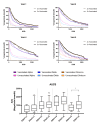Longitudinal effects of SARS-CoV-2 breakthrough infection on imprinting of neutralizing antibody responses
- PMID: 39522353
- PMCID: PMC11585733
- DOI: 10.1016/j.ebiom.2024.105438
Longitudinal effects of SARS-CoV-2 breakthrough infection on imprinting of neutralizing antibody responses
Abstract
Background: The impact of the infecting SARS-CoV-2 variant of concern (VOC) and the vaccination status was determined on the magnitude, breadth, and durability of the neutralizing antibody (nAb) profile in a longitudinal multicentre cohort study.
Methods: 173 vaccinated and 56 non-vaccinated individuals were enrolled after SARS-CoV-2 Alpha, Delta, or Omicron infection and visited four times within 6 months and nAbs were measured for D614G, Alpha, Delta, BA.1, BA.2, BA.5, BQ.1.1, XBB.1.5 and JN.1.
Findings: Magnitude-breadth-analysis showed enhanced neutralization capacity in vaccinated individuals against multiple VOCs. Longitudinal analysis revealed sustained neutralization magnitude-breadth after antigenically distant Delta or Omicron breakthrough infection (BTI), with triple-vaccinated individuals showing significantly elevated titres and improved breadth. Antigenic mapping and antibody landscaping revealed initial boosting of vaccine-induced WT-specific responses after BTI, a shift in neutralization towards infecting VOCs at peak responses and an immune imprinted bias towards dominating WT immunity in the long-term. Despite that bias, machine-learning models confirmed a sustained shift of the immune-profiles following BTI.
Interpretation: In summary, our longitudinal analysis revealed delayed and short lived nAb shifts towards the infecting VOC, but an immune imprinted bias towards long-term vaccine induced immunity after BTI.
Funding: This work was funded by the Bavarian State Ministry of Science and the Arts for the CoVaKo study and the ForCovid project. The funders had no influence on the study design, data analysis or data interpretation.
Keywords: Antigenic map; COVID-19 breakthrough infection; Immune imprinting; Machine learning; Magnitude-breadth; Neutralization; SARS-CoV-2.
Copyright © 2024 The Author(s). Published by Elsevier B.V. All rights reserved.
Conflict of interest statement
Declaration of interests M.P. receives honoraria for scientific talks from Abbvie, BioNTech, Chugai-Roche, GSK, Esanum, Janssen, Novartis, Moderna, MSD, Pfizer, Sanofi, and SOBI, for consultant tasks from Abbvie, BioNTech, GSK, Janssen, Novartis, and Pfizer, travel scholarships from Chugai-Roche, GSK, Novartis, and Pfizer and support for investigator-initiated research from Baxter, Chugai-Roche, Galapagos, GSK, MSD, Moderna, Novartis, Pfizer and SOBI. U.P. received personal fees from Abbott, Abbvie, Arbutus, Gilead, GSK, J&J, MSD, Roche, Sanofi, Sobi, and Vaccitech. U.P. is co-founder, shareholder and board member of SCG Cell Therapy Inc. The CoVaKo consortium was funded by the Bavarian State Ministry of Science and the Arts. The funder had no influence on the study design, data analysis or data interpretation.
Figures
















References
Publication types
MeSH terms
Substances
Supplementary concepts
LinkOut - more resources
Full Text Sources
Medical
Miscellaneous

